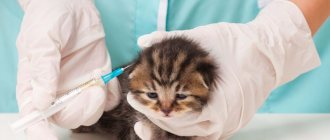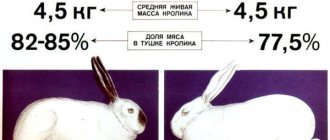Today we will talk about when and what vaccinations should be given to rabbits. After all, proper vaccination of these animals is the only chance to maintain their health. Fluffy pets are extremely whimsical. They can easily catch an infection, which in almost 100% of cases leads to death. The problem is that most rabbit diseases cannot be treated, so all that remains is to vaccinate them. We will tell you how and when to administer drugs and how to prevent mortality on the farm.
Necessity or waste of money
Let's figure out whether rabbits need vaccinations, and when you can do without them. It is an axiom that it is mandatory to vaccinate animals, and you just have to remember it. Experienced rabbit breeders have no doubt about this, but for beginners we will explain.
There are two reasons why it is necessary to vaccinate regular (meat) and decorative rabbits. Firstly, even animals kept in perfect cleanliness and fed with high-quality feed can get sick, as they are very sensitive and whimsical.
Secondly, a vaccine for rabbits is the only chance to save an animal’s life if it becomes infected. And all because most diseases for representatives of the hare family are fatal, and there is no cure for them. So all that remains for rabbit breeders is to take care of the animals and try to anticipate the appearance of infection through timely vaccination.
Guide to the typology of drugs
Now let’s look at what vaccinations are given to rabbits, what is their fundamental difference, and which is better for the animals. All vaccines existing today are divided into inactivated and live according to the speed of manifestation. By disease coverage - single vaccines and complex drugs.
The difference between them is that live vaccines give a quick effect, but are difficult for animals to tolerate. Inactivated serums act slowly, but veterinarians advise vaccinating rabbits with them, since they are more easily tolerated by individuals and have a longer lasting effect.
Mono-vaccines give animals immunity against one disease. Remember that monovalent drugs should be used at intervals of 2 weeks. Complex vaccines for rabbits protect them from several diseases at once. There are bivalent and trivalent drugs (based on the number of antiviruses in them).
Features and advantages of polyvalent drugs
For rabbits, complex vaccinations are in demand among rabbit breeders for a number of reasons. They cause less injury to the animal’s body; there is no need to observe a two-week interval between injections, and this is beneficial. Below are some types of such drugs that are very popular.
A drug that protects against myxomatosis and plague - “Pestorin MorMix”. The advantage of this vaccine for rabbits is that vaccinations are allowed for young animals older than 10 weeks. But be careful, because after opening the ampoules the drug loses its effectiveness after 2 hours.
A remedy that acts as a barrier to two extremely serious diseases - hemorrhagic disease and myxomatosis - Lapimun Hemix. Just like the previous drug, it is approved for vaccination of young animals. The effect of the vaccine will appear after 1-2 weeks and lasts up to 10 months.
When and how to vaccinate rabbits?
There are special vaccines for each infection. You just need to know which vaccinations to get. Some diseases are common in one area but absent in another. That is why the composition of vaccines and the methods of their administration are different.
Vaccination is necessary to prevent the development of the following dangerous diseases:
- Hemorrhagic disease or HBD is extremely dangerous for rabbits. As a rule, from 70 to 100% of pets that catch it die. The disease is dangerous for any rabbit, regardless of age and sex characteristics. This is why it is necessary to vaccinate rabbits against VGBV.
- Myxomatosis, like VGBV, is considered one of the most dangerous diseases. Its carriers are insects. To protect pets from myxomatosis, vaccinations are given between April and September, that is, in spring and summer. At this time, insects carrying the virus are most active. In this case, an associated vaccine is often used. Note that myxomatosis is not common in all regions. Does everyone need vaccinations in this case? The veterinary service can provide information on which areas are at risk and which are not. Based on this: those living outside the affected area do not need to receive mandatory vaccinations.
- Rabies usually affects rabbits purchased for decorative purposes. Rabies vaccination is mandatory, especially if the pet will participate in an exhibition.
- Other diseases. If rabbits are bred for economic purposes, then it is better to get vaccinated to prevent diseases such as: listeriosis, salmonellosis, paratyphoid fever, pasteurellosis. All of them are also very dangerous for rabbits. And vitamins are also introduced that help protect rabbits in winter.
It is allowed to vaccinate rabbits waiting to give birth, but pregnant women must be vaccinated before mating.
If you need to administer a vaccine to a female who will feed her offspring with milk, then it is better to do this when the rabbits are weaned from their mother and they begin to eat food.
A vaccinated rabbit will be protected from diseases for the next six months. In some cases, when an epidemic has begun on the farm, the vaccination schedule may change.
When to administer the vaccine?
After the female gives birth to cubs, she feeds them herself. When a baby rabbit feeds on mother's milk, antibodies enter the body, which improve the baby's immune system. After the mother stops feeding milk, within a month the baby rabbit’s body must independently learn to resist viruses and infections.
At what age is it best to vaccinate little rabbits? As a rule, cubs begin independent life when they are 1 month old. 0.5–1 month after this, the time comes when vaccinations can be done. In special cases, for example, when the VGBV epidemic began, babies, including meat ones, are vaccinated at 1 month, and after 3 months it is repeated.
An adult rabbit is allowed to receive the vaccine once every 6 months. If we are talking about VGBK, then mandatory injections are given to rabbits only after 9 months. The same schedule is followed when vaccinating pregnant individuals.
How to give injections?
The vaccination schedule depends primarily on the breeder. He must know exactly when the offspring were separated from their mother, as well as which individuals will be sent for slaughter.
All this must be taken into account in order to understand when vaccinations need to be done. As already noted, only an epidemic can make adjustments to the developed scheme. A bivalent vaccine will help make it easier for rabbit breeders to schedule vaccinations. Its action is aimed at protecting the rabbit from myxomatosis and hemorrhagic disease.
This kind of vaccine, which is complex in nature, is made in the spring. After them, manipulations with conventional monovalent vaccines are possible. They are necessary for individuals who were recently purchased and for female rabbits waiting to give birth.
Once the vaccine for rabbits is administered, its effect will occur only after 2 weeks. Until this point, individuals must be quarantined to exclude the possibility of infection. This is especially true in the summer, since in winter viruses do not multiply and often do not infect animals.
Let's protect fluffies from bloodsuckers
In this article, we not only find out whether rabbits need vaccinations, but also tell you how to make the life of fluffies as comfortable and long as possible. It's not just diseases that can cripple these sensitive pets. External irritants such as mosquitoes can cause just as much trouble.
Mosquitoes cause double harm to rabbits. When they bite, they inject poison, causing the animals to have an allergic reaction that ends in scabies. This, in turn, leads to anxiety in the animals and their depression. To protect rabbits from bloodsuckers, drugs containing cypermethrin are used. For use in cells – “Tsiperil”. To treat the room - “Medilis-tsiper”.
The second means can be used to treat not only the internal, but also the external walls of the room where rabbits are kept. We recommend that you use both products to fully protect your animals from mosquitoes.
Warning: dangerous virus
Since we are telling you about what and when vaccinations to give a rabbit, we are obliged to dwell in more detail on myxomatosis. This is one of the most dangerous viruses, and without immunization the baby rabbit will die in 80-100% of cases. The disease is transmitted by mosquitoes. Above we told you how best to protect yourself from them.
But it is still necessary to vaccinate your rabbit against myxomatosis. The vaccine is administered to animals of all ages and in all areas, regardless of their reliability. Such reinsurance is necessary, because it only takes one individual to become infected with the virus, and an epidemic will begin on the farm in a matter of days.
To protect pets from the virus, they are injected with the drug “RIBBYVAK B”. This is a monovalent associated vaccine that provides immunity for 12 months. But polyvalent drugs also contain an antivirus for myxomatosis. For more information about their action and technology of application, read the article “Use of associated vaccine for rabbits.”
Vaccination of pregnant rabbits
It is worth noting that during pregnancy, rabbits can be vaccinated with all vaccines. The exception is the lactation period, when the mother feeds the offspring. The drugs contain viral strains in small concentrations, which can negatively affect the condition of babies and provoke a mild infection.
During pregnancy, it is best for females to use special immunized serums and complex veterinary preparations. Vaccination is done under the strict supervision of a veterinarian. The owner must monitor them closely over the following days. If you notice any side symptoms, contact your veterinarian. It is best to vaccinate rabbits before pregnancy.
It is better to entrust immunization of pregnant rabbits to a veterinarian
There is a specific vaccination schedule for furry pets, which will tell you when it is best to immunize. Each rabbit breeding farm has a schedule and a special vaccination table. Let's consider what and when to vaccinate rabbits, what vaccines are used for immunization.
Vaccination against myxomatosis
As already noted, the carriers of myxomatosis pathogens are blood-sucking, arthropod insects. Therefore, it is best to administer a vaccine against this disease to animals in early spring, during the period of ectoparasite activity. Myxomatosis is an acute, highly contagious viral disease that is fatal in almost all cases.
The infection is deadly and spreads very quickly from infected individuals to healthy pets. Only timely vaccination can save you from it. For immunization, RABBIVAK B is used, a monovalent associated vaccine against myxomatosis.
Vaccine for rabbits against myxomatosis
Important! It is best to entrust vaccination of rabbits against myxomatosis and other infectious diseases to a veterinarian. The doctor will select the drug and dosage. The vaccine against myxomatosis is administered intramuscularly, subcutaneously.
Vaccination against myxomatosis of rabbits is done to immunize rabbits and adults in prosperous and disadvantaged regions.
Also used in immunization is an associated vaccine against myxomatosis, which protects animals from other dangerous diseases.
Vaccine against hemorrhagic disease
Rabbit viral hemorrhagic disease is a deadly infection for fur-bearing animals, which can last from 2 to 6 days and proceed latently. Rabbits are vaccinated against this infection with the RABBIVAK V vaccine. It is a light, light brown suspension. How to vaccinate animals is indicated in the instructions for the veterinary drug.
If you are breeding rabbits for slaughter: grafting features
Vaccinations for meat rabbits are practically no different from those given to decorative rabbits. But there are two diseases that specifically affect animals raised for slaughter: pasteurellosis and salmonellosis. If the vaccine is not used in a timely manner, it can be very difficult to cure the animals.
Vaccination of rabbits against pasteurellosis begins at four weeks of age. The first injection is given to animals at 4 weeks, the second at 7 weeks, and the third at 10 weeks. Immunity after vaccination lasts for 8 months, but it is recommended to repeat the procedure every six months.
Immunization against salmonellosis is carried out on rabbits as soon as they reach one month of age. This is due to the fact that young animals and pregnant females are most susceptible to infection. The vaccine is administered at intervals of 7 days in two stages. Make sure that the animals on the farm are vaccinated in a timely manner, this will make your work easier.
How should rabbits be vaccinated?
Remember! Vaccination is carried out according to the instructions for use of the vaccine. Vaccines do not cure diseases; they are intended to prevent diseases.
After vaccination, rabbits must be observed for two days (monitor body temperature (let me remind you: the normal body temperature of a rabbit is 38.5-39.5 ° C), behavior, and mood of the animals).
Before vaccinating rabbits, the day before it is necessary to treat the animals against internal (helminths) and external (fleas, lice, if any) parasites. It turns out that the presence of helminths in rabbits greatly reduces the effectiveness of the vaccine.
Within 12-14 days after vaccination, rabbits are not recommended to suddenly change their diet, or treat animals against parasites. During this period, it is recommended to protect rabbits from all stress.
The first vaccination for rabbits is carried out at the age of 1.5-2 months. By this time, the rabbits lose their active (maternal) immunity and become defenseless against diseases.
Vaccinating rabbits is undoubtedly worthwhile. But in order for rabbits not to get sick, it is still necessary to carry out measures aimed at preventing rabbit diseases, and even better - to prevent the occurrence of diseases.
To protect rabbits from diseases, the following measures can be recommended:
- control the quality of storage and feeding of feed;
- prevent exposure to factors that contribute to the occurrence of diseases;
- create conditions to prevent the accumulation and spread of opportunistic microbes;
- prevent the introduction of infections from outside;
- increase the natural resistance and immunological reactivity of rabbits;
- comply with veterinary and sanitary rules.
The video “Vaccination of Rabbits” shows how to vaccinate animals at home:
- Author: admin
Rate this article:
- 5
- 4
- 3
- 2
- 1
(0 votes, average: 0 out of 5)
Share with your friends!
Reinsurance or a rabbit ticket for traveling abroad
Since we have raised the issue of vaccinations for rabbits and when to do them, we cannot fail to note the procedure for rabies vaccination. Although this serum is not included in the list of mandatory drugs administered to rabbits, it is better to play it safe and give the animal an injection.
Rabbits are vaccinated against rabies once in their entire life and at any age.
Many breeders neglect vaccinating against rabies, believing that such vaccinations are not necessary for decorative rabbits. On the one hand, they are right, since there is practically no risk of contracting this disease by animals growing in greenhouse conditions.
On the other hand, it is not equal to zero. In addition, it is prohibited to export a rabbit that has not been vaccinated against rabies from the country. If you are raising animals for exhibitions, then you should definitely take care of such vaccination so as not to create additional hassle in the future.
What infectious diseases are rabbits vaccinated against?
What vaccinations are given to rabbits? This question interests novice farmers and breeders of decorative rabbits. If you breed these animals, in rabbit farming it is mandatory for fur-bearing animals to be vaccinated against viral hemorrhagic disease (VHD) and myxomatosis. All representatives of the rabbit family are susceptible to these infections.
After infection, the penetration of dangerous viruses into the body of animals, damage occurs to all internal organs and systems. The disease spreads quickly throughout the herd and in 70–100% of cases ends in the death of all pets. Therefore, vaccination against VGBV will help avoid infection of rabbits with a viral infection.
recommended articles:
- Prevention of diseases in turkey poults: what vitamins to give?
- Eriprim: instructions for use for birds
Important! In regions with a favorable epizootological situation for myxomatosis, it is possible not to vaccinate rabbits against this infection. You can find out what infections are common in your area at veterinary clinics and regional veterinary services.
If you keep decorative rabbits at home, veterinarians, in addition to vaccination against VGBV, recommend mandatory immunization against rabies. In addition to the fact that the chances of contracting a deadly infection are high, if pets are not vaccinated against rabies, animals will not be able to cross the border or take part in exhibitions or breeding. The veterinary passport must contain all the necessary stamps and signatures on the immunization performed. Therefore, rabies vaccination is mandatory.
Decorative rabbits can be vaccinated from 45 days of age
In regions unfavorable for listeriosis, salmonellosis, paratyphoid fever, rabbits also need to be vaccinated against these infections to avoid possible infection. Experts also recommend vaccinating rabbits against pasteurellosis. A complex vaccine that contains weakened, inactivated strains of pathogens will help prevent infections.
Hamlet's suffering
This section of the article is written for beginner rabbit breeders, since experienced breeders do not have dilemmas whether to vaccinate rabbits or not. Most problems arise when immunizing animals against rabies, pasteurellosis, salmonellosis or listeriosis.
This is due to the fact that the above vaccinations for rabbits are not mandatory and are done only if the livestock breeders wish or as prescribed by a veterinarian. We have already said above why it is still worth immunizing animals against rabies, pasteurellosis and salmonellosis.
Mainly females are vaccinated against lesteriosis, since they are the ones most susceptible to this infection. But the disease is fatal, and it is better to inject a rabbit and not worry about its health than to hope for a miracle. The duration of acquired immunity after vaccination is up to 6 months.
Optional vaccines
Rabbits often suffer from pasteurellosis, salmonellosis, and listeriosis. The decision to vaccinate against these diseases should be made by a doctor. The main symptoms of pasteurellosis include the following:
- increase in temperature;
- lacrimation;
- feverish condition.
Pasteurellosis mainly appears on large farms due to violations of animal care rules. The first injection is given at 1-1.5 months. Then, during the first year of life, you need to perform another 2-3 revaccinations. Subsequently, injections are performed every 6 months.
See also
Composition of Diclacox Forte, dosage and instructions for use for rabbitsRead
Key symptoms of salmonellosis include:
- diarrhea;
- intense vomiting;
- loss of appetite.
Animals should be vaccinated against salmonellosis in the same way as against pasteurellosis. In this case, the interval between vaccinations should be at least 14 days. Females are more susceptible to listeriosis. As the pathology develops, they lose their appetite. Weakness and apathy often occur. A comprehensive vaccination helps prevent all three diseases. In this case, the vaccination schedule is selected by the doctor.
Blocking VGBK
So we get to the topic of how to vaccinate rabbits against hemorrhagic disease. Remember that we must vaccinate animals against VGBV, since there is no treatment for the virus . But please note that the drug can only be administered to healthy individuals, otherwise complications will arise.
The first vaccination against VGBV can be given to rabbits at the age of 45 days if they have reached a weight of 500 g. If their weight is less, then vaccination should be postponed, but not delayed. When immunizing against hemorrhagic disease, there is a strict injection schedule:
- first injection at 1.5 months;
- second injection at 4.5 months;
- third injection at 10.5 months;
- subsequent injections - every six months.
To vaccinate rabbits against VGBV, you can use a single vaccine or associated two-component drugs. Their effectiveness is the same, but the second option is the most profitable.
Complex vaccines for rabbits
In addition to monovalent drugs, there is a complex, associated vaccine for rabbits against viral infectious diseases. In veterinary medicine, RABBIVAK VB or vaccines from Nobivac, for example, Nobivac Myxo-RHD, are used for immunization. For vaccination, two separate ampoules of RABBIVAK V and B are used.
Associated vaccine for rabbits
Important! For rabbits against myxomatosis and VGBV, you can use mono- and polyvaccines of domestic and foreign production.
Complex vaccination is given to rabbits at the age of 1.5 months, but provided that the baby rabbit’s weight has reached 500 grams. Revaccination is given to babies at 4.5 months. Subsequently, for the purpose of prevention, pets are immunized annually, adhering to the established vaccination schedule.
Complex vaccination for rabbits provides stable immunity and increases the body’s overall resistance to various types of infections.
An associated vaccine for rabbits against myxomatosis and VGBV is made from the B-82 strain of the myxoma virus and the B-87 strain of the hemorrhagic disease virus. The injection drug is a porous dry mass of pale pink, light brown color. The vaccine is packaged in 0.5; 1; 2 ml in sterile ampoules with a capacity of 2, 3, 4, 5, 6 ml or in bottles of 10 and 20 ml.
Table of veterinary measures on a rabbit farm
As promised at the beginning of the article, we tell you when to vaccinate against the rabbit virus, against what diseases and what is the dosage of the drug. Let’s immediately make a reservation that we will tell you the general picture of immunization and give examples of monovalent sera.
The table shows the vaccination scheme for rabbits without taking into account optional vaccinations, since we discussed them in detail above.
We have given only one version of the immunization schedule on a rabbit farm. But each breeder must have his own calendar, where all vaccinations given will be noted. This will allow you to administer the drug in a timely manner and prevent the occurrence of diseases. Over time, you will understand how important it is to keep such records.
Vaccination with RABBIVAK V vaccine against VGBV
Vaccinations against the viral hemorrhagic disease RABBIVAK V are carried out at intervals of 14 days after vaccination against myxomatosis. This additionally injures the rabbit and complicates the vaccination schedule and subsequent revaccination, which is why many owners prefer associated complex vaccines.
The drug is packaged in glass bottles from 1 to 100 doses. The solution is prepared at the rate of 1 ml of water for injection per 1 dose. The injection is performed subcutaneously or intramuscularly, in the same way as the myxomatosis vaccine RABBIVAK B, in the same doses and at the same time.
We give injections ourselves
Now we will tell you about how to properly vaccinate a rabbit at home.
A week before the vaccine is administered, it is recommended to worm the animals and place sick animals in an isolation ward.
Remember that all injections are made with different syringes. Draw up the drug, then release the air from the syringe and inject. When vaccinating rabbits, they must be securely restrained, otherwise the animals may break free and injure themselves. Do not forget to treat the injection site. For example, chlorhexidine or any other antiseptic.
The first option for administering the vaccine is an injection into the withers. To do this, pull back the skin on the back of the neck, in the area of the shoulder blades. Spread the fur and insert the needle parallel to the body. You will feel when the needle pierces the skin. Inject the drug and remove the syringe. Lightly massage the injection site to disperse the medication.
Vaccination of rabbits can also be carried out intramuscularly. Then the injection is made into the thigh, perpendicular to its surface. The depth of needle insertion depends on the size of the animal. For small breeds it is a few millimeters. For large bunnies - 0.5-1 cm. Do not worry if blood starts to appear during the administration of the medicine - you just touched a vessel and there is nothing to worry about.
Should rabbits be vaccinated at home?
This is really beneficial, especially if you need to vaccinate an entire herd of lagomorphs. There is no need to take them to the clinic and pay for each procedure. It is enough to purchase the drug and administer the required dose. But before vaccination, you need to consult with a veterinarian, who will select the appropriate drug, determine the dose and draw up a regimen.
Important! Before purchasing a vaccine, you need to check the certificate and expiration date of the drug.
Instructions for vaccination at home for beginners:
- The powder is diluted with the solvent strictly according to the instructions. You should get 0.5 ml of solution.
- For vaccination, a disposable insulin syringe is used. If a herd of rabbits is being vaccinated, the needle is changed every time.
- The syringe and puncture site are wiped with a cotton swab and alcohol. The injection is given subcutaneously or intramuscularly. In the first case, the skin at the withers is pulled back, the needle is inserted into the fold so as not to pierce the second layer of skin. In the second case, the injection is made into the thigh muscle.
- After administering the medicine, the skin is wiped with alcohol.
Opened vaccine must be used within 3 hours. Then it becomes unsuitable for use, and the bottle and any remaining medication must be disposed of.
Important! In order not to injure the rabbit, you need to ask loved ones to hold it during the procedure.
After vaccination, rabbits at home must be quarantined. The animal is isolated from other animals. Avoid stress and temperature changes. The pet's diet is supplemented with vitamin and mineral supplements.
Vaccinations for rabbits are very important as they provide them with protection against deadly infections. To develop specific immunity, you need to choose the right drug, dose and vaccination regimen, and prepare for the procedure. And after vaccination, it is necessary to monitor the animal for 15–20 days. If redness, swelling at the injection site, rash, hypersalivation, lethargy, or shortness of breath appear, you should visit a veterinarian. Timely vaccination is the only way to prevent dangerous diseases.
Important nuances
Pregnant rabbits not only can, but also need to be vaccinated - it is completely safe. But during the lactation period, it is recommended to refrain from any injections and strong antibiotics, since their components, along with the milk, will reach the babies.
It is recommended to start vaccinating your rabbit at 1.5 months (with the exception of vaccines developed specifically for young animals). But in farms recognized as unfavorable, and in the absence of mother’s milk, babies are immunized from the age of thirty days.
There is no seasonal framework for vaccination. But rabbit breeders prefer to introduce serums in the fall and spring. There are also exceptional cases, for example, mosquito control. In winter, these bloodsuckers do not bother rabbits, so there is no need to get rid of them.
Vaccination with RABBIVAK B vaccine against myxomatosis
The Russian-made vaccine RABBIVAK B is used for vaccination against myxomatosis. The drug is packaged in ampoules or glass bottles with a capacity of 1 to 100 doses. The vaccine looks like a dry porous substance of light pink or yellowish color.
When to get vaccinated?
Vaccination against myxomatosis is performed:
- initially in 30-45 days upon reaching a weight of 500g;
- repeated (re-vaccination) 3 months after the first vaccination;
- every six months or year.
How to vaccinate rabbits?
Before use, the dry vaccine is diluted with water for injection in a proportion of 1 ml per 1 dose, shaking the resulting solution, which is suitable for use for 2 hours after dissolution.
The vaccination is performed in a dose of 1 ml subcutaneously or intramuscularly into the thigh muscle.
The period of stable immunity of a rabbit is at least a year, but many rabbit breeders prefer to vaccinate more often - every six months, which is quite justified, especially if the region has a difficult epizootic situation.
Possible complications
Almost always, the vaccination process for rabbits goes well - without complications. But in particular situations, animals may develop an allergic reaction after 15-20 minutes, which is expressed by a number of signs:
- redness of mucous membranes;
- skin rashes;
- excessive salivation;
- drowsiness;
- breathing problems;
- fainting.
To relieve allergic symptoms, rabbits are injected intramuscularly with 0.3 ml of Suprastin or Diphenhydramine. To normalize heart function, a subcutaneous injection of Sulfocamphocaine (0.3 ml) is given.
Discuss important points regarding vaccinations in the comments.
If you are afraid of losing useful information, then save it on your page by clicking the repost button.











